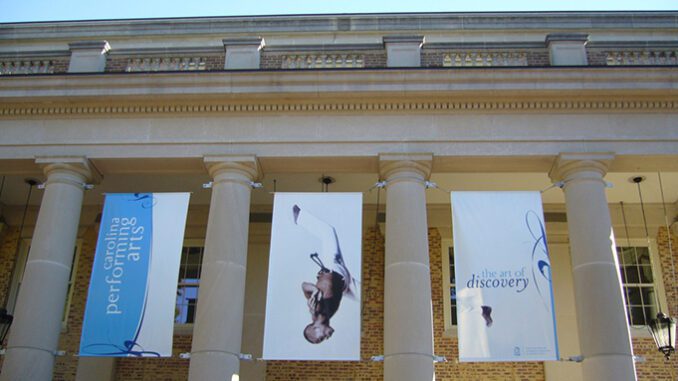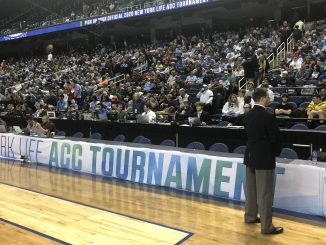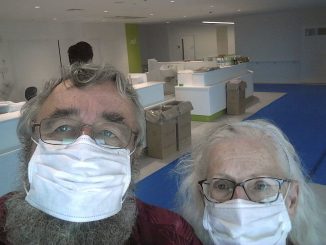
RALEIGH — A year into the coronavirus pandemic, capacity limits and safety concerns remain an issue for members of North Carolina’s performing arts industry however the overwhelming sentiment is that the upcoming 2021-2022 season can still be salvaged – even if under adjusted guidelines.
Last spring, theatres both large and small were forced to cancel or postpone their entire 2020 seasons, laying off workers and losing millions of dollars in ticket sales revenue along the way. But against the backdrop of North Carolina Governor Roy Cooper recently easing some of the state’s limitations on gatherings, theater officials here say they are optimistic they can offer theatergoers some form of the in person show experience sometime later this year. The new Executive Order 195 allows for indoor venues including performing arts venues to operate at 30% capacity but not exceeding 250 people. This is great news for the arts but larger questions still remain as far as what will “seeing a show” look like in a post-pandemic world, and when will the general public feel it is safe to enjoy live entertainment again.
Raleigh Convention Center & Performing Arts Complex Director and General Manager Kerry Painter says they have shows on the books starting as early as this spring and that the new order will make it even easier to start bringing back in person events. She adds that if for some reason restrictions don’t allow them they are prepared to reschedule artists and performances. “The priority and biggest challenge moving forward is helping patrons feel safe in our venues and continuing to keep up our high levels of safety once people are back out and feeling like ‘COVID is over,’” she says.
A downtown Raleigh mainstay since 1932, Duke Energy Center is certainly Raleigh’s grandest performing arts venue. It has played host to Broadway classics, rock legends and major political figures over the years and in a non-pandemic year, can accommodate up to 4869 guests at one time between its four separate auditoriums. The convention center and performing arts complex is the first multi-venue complex in North Carolina to receive Global Biorisk Advisory Council (GBAC STAR™) accreditation, an honor bestowed to facilities for having implemented the most stringent protocols for cleaning, disinfection and infectious disease prevention in its venues. “Our teams have revamped all protocols and have been practicing to be ready for guests,” Painter says. “Of course spacing, masks, touchless amenities like ticket scanning and concession orders will make people feel and be safer.”
As a city owned facility, the Duke Energy Center was not eligible for PPP loans and Painter says their revenues completely stopped over the course of the past year. “We of course like everyone else had to be ultra-cautious about budgets and spending. We have the venues mostly shut down to conserve. We spend a significant amount of time working to fill the venues when they do reopen, and this alone can be a challenge since it all relies on unknown information such as COVID numbers and executive orders.”
State and local governments from coast to coast have been struggling to find the right balance between restricting public activities to prevent the spread of COVID-19, versus allowing businesses to resume activity and keep the economy going. Meanwhile, according to recent Labor Department data, the entertainment industry lost 800,000 jobs as of January 2021 compared with February of last year.
Considerably smaller than the Duke Energy Center, Raleigh Little Theater is a largely volunteer based operation that has both indoor and outdoor amphitheaters. Executive Director Heather Strickland says they had to cut both full time and part time staff last year and would likely be operating at only 60% their normal operating budget for the upcoming 2021 season. RLT canceled its indoor shows for the 2020 season while hosting some in its outside space. Strickland says it was heartbreaking, but they are now looking on the bright side and have identified new and innovative ways to serve the arts community moving forward. “RLT is looking at shows that we can do outside in our amphitheater, that have small casts and crews, and are stories that are important to our community. It is hard to find shows that meet all of these guidelines, especially when you are also considering how we keep volunteers, staff, and audiences socially distant,” she says.
Strickland says that although they received a lot of federal funding including two draws on the PPP, funding through the National Endowment for the Arts, and even county CARES Act funding, it could be 2025 before their operating budget is back to what it was pre-pandemic. “This means that by the end of all this, RLT will have taken a nearly $2 million hit from this crisis,” she says.
Despite the economic devastation the industry has had to endure, Strickland and others will be the first to admit they value their patrons’ safety over making a profit and that the lockdown measures were justified. “Yes, any action taken in the name of protecting the health and safety of our community is critical. The restrictions and guidelines for gathering are in an effort to care for people — we want to be supportive of that priority.” Organizers also say the community has been incredibly supportive even if they’ve had to watch shows virtually, which most theaters have allowed to take place. “Our community really rallies around us in some pretty extraordinary ways,” Strickland says. “Donations are certainly up. But our community stayed engaged with us too — watching shows, joining classes, participating in virtual community events.”
Jana Jackson, director of marketing and communications for Carolina Performing Arts at UNC-Chapel Hill says that looking ahead, the challenges they see on the horizon center around knowing when and how they will be able to offer pre-pandemic style performances in their venues again. She says they will be announcing the 2021-2022 season in the early fall. Pre-COVID their Memorial Hall seated 1400, and their Moeser Auditorium in Hill Hall seated up to 430 people. “Like the majority of arts organizations across the country, when we had to cancel our in-person performances last spring, we saw a dip in ticket revenue. Thankfully, due to quick actions of our staff and leadership and incredible support from our loyal patrons and donors, we minimized potential significant losses,” Jackson says. With such a different season ahead CPA has opted to not sell subscription packages this year. That said, the pandemic reaffirmed what Jackson says she always knew: “Carolina Performing Arts has loyal stakeholders who have rallied around our organization, and the arts in the Triangle, because they believe in the work being done.”
For its part, the Federal Government is working to offer more assistance to the performing arts industry. Congress recently authorized a $15 billion Shuttered Venue Operators Grant program to aid companies that host live events. Applicants would be eligible for grants equal to 45% of their 2019 gross earned revenue, and up to $10 million maximum.
There will always be an appetite for shows and personal stories. Moving forward, the experience may look very different – a combination of hybrid productions, tape and live, or more small intimate theatres instead of larger venues. Perhaps one should look at how Australia has done it. The country was far more successful at containing the virus and hosted a Broadway season last year. But even there shows look different. Overseas actors are greeted by robots that take their temperatures, guests scan QR codes so they can register for contact tracing upon arrival, patrons are admitted at staggered times, and get audio reminders to wear a mask, practice good hygiene and eat and drink only while seated. Although the experience may never be what it once was, as they say, “the show must go on.”



